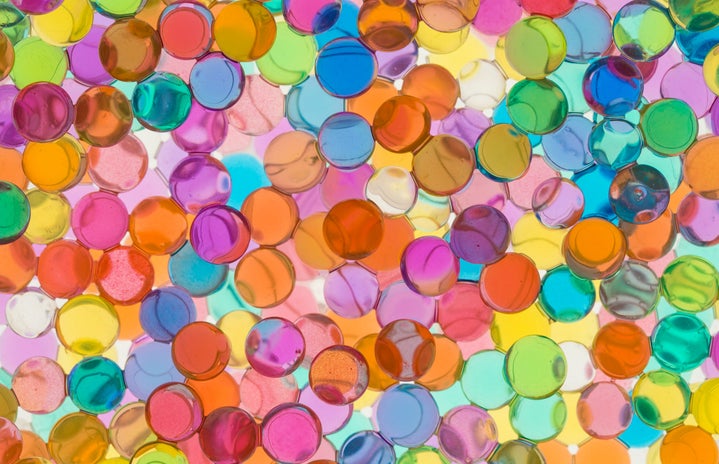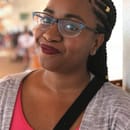This article will include mentions of depression, suicidal ideation, vomiting. Please give this article a pass if the topics herein may be triggering.
In 2013, I was a senior in high school. I chose a Vera Wang dress for prom, signed yearbooks with a flourish, replied to more colleges than I can remember, and made tearful promises to my friends that we’d stay close over summer break. I also lost 20 pounds, would briefly lose my eyesight when I stood up too fast, had crippling pains in my abdomen, and had no urge to eat for days at a time. The Crohn’s Disease diagnosis that came three months after I nearly fainted in graduation rehearsal was a relief. It put a name to an inarticulate fear that I’d carried with me as surely as I carried my diploma across the stage that year.
I’ve written about having Crohn’s Disease before, not long after I got out of surgery this year. But this is the first time that I really thought about the impact that it’s had on me. Sure, it’s changed the way I eat—I’ve permanently kissed goodbye most vegetables, dairy, seeds, and high-fiber foods—but more importantly, Crohn’s Disease has put so many of my other priorities into perspective. It’s the reason I’ve reassessed my friend and familial relationships. It’s the reason I’ve changed my living situation and my graduation date. It’s the reason I wear crop tops and snug clothes, and also the reason I avoid wearing belts. As much as Crohn’s has changed me, it’s also helped me learn to know myself.
I threw up in my bathtub two days after withdrawing from my spring 2016 classes. I’d woken in the dead of night and barely made it to the bathroom. My vomit was violently red, and I cried over the lip of the tub, gagging on the smell and panicking until I realized I’d eaten strawberries before going to sleep. I crawled over to my bathroom door and knocked hard until my dad heard me crying for help. He joked that it was karma for not cleaning up my puke when I was a baby. It would not be the last time he’d make that joke, and I soon came to appreciate it for what it was: his desperate attempt to keep my spirits up.
My relationship with my dad has always been somewhat strained, partly as a result of growing up liberal in a conservative household, and partly because I’m as stubborn as he is. As a result, there’s always been a weird disconnect between what I’ve meant to say to my dad, and what he actually heard. This failure of communication was a main source of tension that all but evaporated over the summer. My dependence on my father over the course of the summer led us to bond during late night talks when I couldn’t sleep because of steroid withdrawal pains. My father got a face-to-face look at my acute depression those nights. I would lay cradled on a stack of pillows, lungs burning and body shaking uncontrollably. My dad would lie next to me and just talk, or hush me while I cried or asked over and over again to die. In the light of day, we would watch action flicks on Netflix, or he would talk trash while I marathoned three seasons of Community. When my brother got home, I’d watch Gravity Falls with him, and my dad could be heard typing at his computer, occasionally shouting for us to turn it down.
That summer, I also reshuffled my mental friend list. Two friends that I hadn’t talked to in years messaged me every other day for a week when I was suicidal. Another living nearby seemed to forget me almost entirely. Still another that I’d seen in person a whole two times that semester let me stay the night when I was in too much pain to drive home. It was a learning experience, and an important one. It taught me that I need to keep in touch with the people I care about, and also to gracefully let go of those that don’t care for me. I often keep that thought at the forefront of my mind in my new relationships, and do my damnedest to remember that I cannot know what struggle my friends are battling if I don’t ask them.
I’d been waiting to get my discharge papers for hours. More than anything I wanted the IV out of my arm, but I was also extremely curious to know what the ileosecotomy scar under my slightly bloody bandage was going to look like. The nurse finally came in to give me both good and bad news: I couldn’t leave just yet, but she could take off the bandage. The skin underneath was crusted with old blood. My scar was ragged and thick. It was an uneven curve around my bellybutton as long as my ring finger, and had staples protruding out of it. Everything was swollen because my guts were inflamed and healing, according to the nurse. She said the scar was healing well. That it looked “good.”
When I was finally discharged that night, I painstakingly pulled the softest, loosest shirt I owned over myself. It tugged at my staples, making my skin feel rubbed raw. I began to wear crop tops out of necessity, and the irony was not lost on me when I put on a bright pink one I’d never worn before despite owning it for almost a year because I hadn’t had the guts to before. When the scar healed fully, I switched to crop tops and high-waisted jeans in an effort to reclaim my confidence while still hiding the feature I was still most insecure about. I still get self-conscious about my scar sometimes (I occasionally compare it to the scars of other Crohnie’s and wish my surgeon was just a little more meticulous), but I’ve learned to love the rest of my body. It’s carried me through over 20 years of my life, and I’ve finally come to appreciate its strength and endurance. A fun side-effect of this is that I got to redo my wardrobe, and hot damn do I look good in crop tops and muscle tees.
A visit to my gastroenterologist led to yet another fashion choice.
“Your surgeon had to remove your ileocecal valve. It’s the part of your lower intestine that regulates your urgency to poop, basically.” If I hadn’t been black, I would have been red as a tomato. My GI went on to tell me that if I was ever stuck in a line, to play the Crohn’s Disease card if I really had to go. “You have my permission to skip everyone,” he told me seriously. He also wrote me a prescription that reduced the urge if I was in a situation where I might be far from a bathroom for several hours. I pretty much stopped wearing belts that day, and also made a point to know where the bathroom is any building I enter. It hasn’t been a problem yet, thank god, but I’ll be damned if I let it become one.
I remember several nights where I lay awake in my bed thinking about how easy it would be to roll out of bed, walk outside, and take the three steps down into the pool in my backyard. I knew my dad had a life insurance policy on me, and that the hospital bills were coming. I also knew that my sister was struggling with her student loans, that my brother had job insecurity, and that it was slow season for my dad’s accounting business. I lay there and told myself to “breathe, just breathe,” the same way my father had when I was shivering earlier. It became a refrain most nights when I thought of the pool waiting outside, when the staples tugged or I could feel the weight of the medical bills on my chest.
I never thought I’d be thankful for a disease that affected its victims in ways that were indecorous to speak about in polite company, or that I’d be thankful for the nights I thought I couldn’t breathe. I never thought I’d be thankful for the day my brother read birth control side effects to me until I got bored and fell asleep. Nor did I think I would smile looking back on the day where the most productive thing I did in the hospital was watch K.C. Undercover with my sister and blow into a respirometer. I am though, and nearly every day I’m thankful for my surgeon and his haphazard sew job, my nurses’ constant questions about my bowel movements, my dad making truly the worst puns in existence, and my brother seriously questioning the plot points of Gravity Falls.
As much as I wish I could return to who I was before my diagnosis in 2013 and to have never even heard of Crohn’s Disease, I have grown so much as a person because of it. I can say with surety that I am a stronger person now, and a better one. Though I still have days where I sleep with a trash can next to my bed, and now have to inject myself biweekly, I am honestly so thankful for the growth Crohn’s Disease has given me.
I am so thankful for Crohn’s disease.



